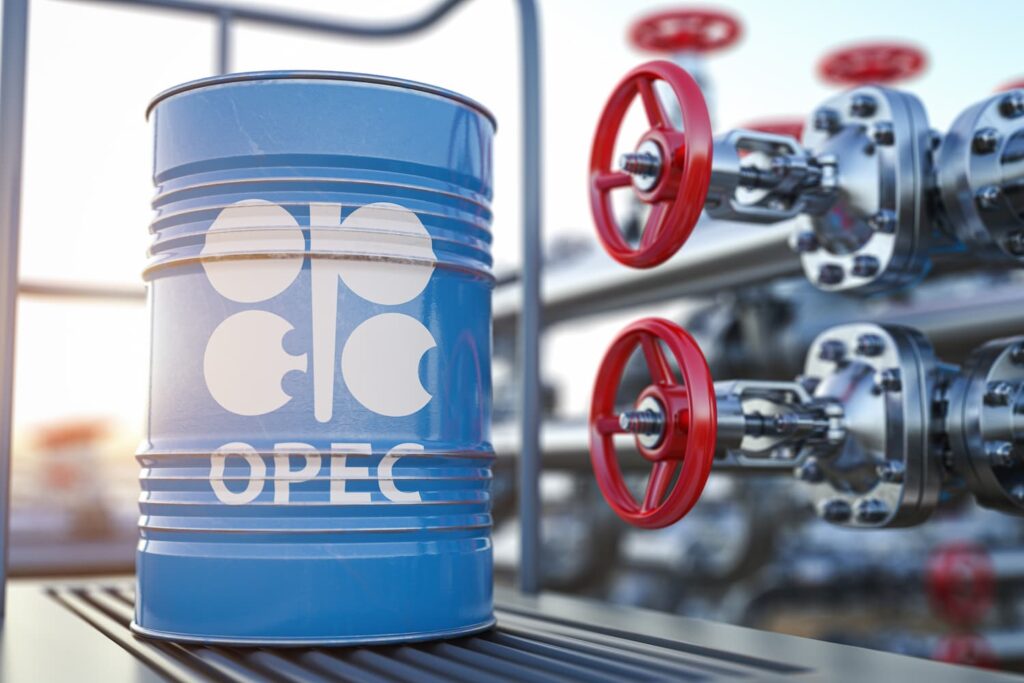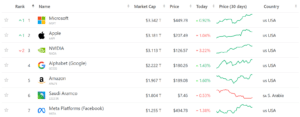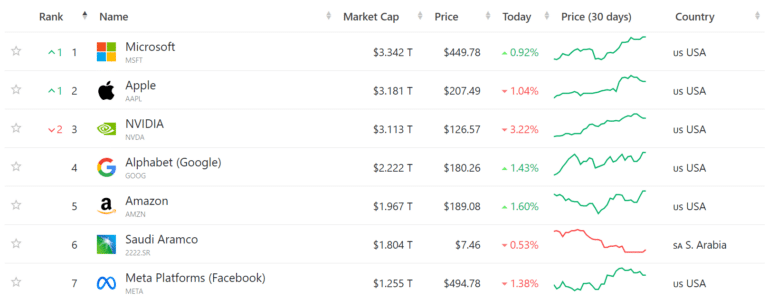Few institutions hold as much influence over the ever-evolving and volatile landscape of global energy as the Organisation of the Petroleum Exporting Countries, or OPEC.
Formed in 1960, OPEC has become synonymous with the oil industry, shaping production levels and influencing prices. This comprehensive explainer will help you discover its history, purpose, and powerful influence over the markets.
Table of Contents:
What is OPEC?
OPEC is a coalition of oil-producing nations that united to coordinate and stabilise oil prices in the global market.
- It was founded on September 14, 1960, in Baghdad, Iraq.
- Its founding members included Iran, Iraq, Kuwait, Saudi Arabia, and Venezuela, but has since expanded to include a net total of 12 member countries.
- These include Libya, the United Arab Emirates, Algeria, Nigeria, Gabon, Equatorial Guinea, and Congo.
OPEC’s primary goal is to ensure fair compensation for oil-producing nations and stabilise oil prices to support their economies.
OPEC was Started with The Goal of a Stable and Fair Oil Market
OPEC’s origins trace back to the recognition of oil as a strategic resource, with the founding members wanting to coordinate their production and pricing policies to ensure a more stable and fair market for oil.
The organisation was formed in response to the dominance of the “Seven Sisters,” a group of multinational oil companies that controlled the global oil market at the time. Collective bargaining with oil companies allowed member nations to maximise profits and exert greater control over their economies.
How Does OPEC Work?
OPEC coordinates the petroleum policies of its member countries to control production and secure a steady income for member countries. Here’s how it works:
- Decision making:
OPEC’s decision-making process involves regular meetings of its member countries to discuss market conditions and coordinate policies. Decisions are typically made by consensus, with each member country having a voice in the process. - Production quotas:
OPEC sets production quotas for each member country to help stabilise prices and manage supply. Quotas are based on factors such as each country’s production capacity, reserves, and economic needs. - Market monitoring:
OPEC closely monitors global oil supply and demand levels to inform its production decisions and prevent market oversupply or undersupply. - Coordination with non-OPEC producers:
OPEC works with other major oil producers, such as Russia, to coordinate production levels and maintain price stability. - Public statements:
OPEC uses public statements and announcements to signal its intentions and influence market sentiment.
Why OPEC Matters to Traders
OPEC’s decisions and actions have significant implications for global oil markets, which, in turn, can affect various financial instruments and trading strategies.
- Influence on oil prices: Any changes in OPEC’s production quotas or output can lead to significant fluctuations in oil prices, affecting trading opportunities in crude oil futures, exchange-traded funds (ETFs), and energy-related stocks.
- Market volatility: OPEC announcements and meetings often introduce volatility into oil markets. Traders who are prepared to capitalise on sudden price movements can find profitable opportunities, especially in derivatives markets where volatility can lead to increased trading volumes and potential earnings.
- Geopolitics: OPEC’s member countries are spread across various regions with diverse geopolitical interests. Any geopolitical tensions or conflicts among member nations can impact oil supply disruptions and market sentiment.
- Impact on currencies and commodities: Fluctuations in oil prices driven by OPEC’s actions can also influence currency pairs and commodity prices. For example, currencies of oil-exporting nations may experience volatility in response to changes in oil prices, affecting forex trading strategies. Moreover, commodities like gold and copper, which are sensitive to changes in inflation and economic growth, can be influenced by oil price movements driven by OPEC decisions.
- Macro-economic implications: Changes in oil prices can impact inflation rates, central bank interest rate decisions, and overall economic growth prospects. Traders need to assess how OPEC’s actions align with broader economic trends and adjust their trading strategies accordingly.
- Interplay with other energies: OPEC’s decisions can influence the attractiveness and market competitiveness of alternative energy sources such as natural gas.
OPEC’s Role in Influencing Oil Prices
OPEC exercises considerable influence over global oil prices through a combination of production adjustments, coordination with other producers, market monitoring, and strategic communication.
Quick Facts: Major Historical Events Impacting OPEC Revenues
- The oil embargo of 1973, in response to political tensions in the Middle East, drove the prices of oil upwards and underscored OPEC’s influence on oil markets.
- The oil price crash of 1986, which led to a 58% decline in OPEC crude oil prices, leading to a sharp decline in revenues for member nations (especially Saudi Arabia and Kuwait).
- Geopolitical tensions in the Middle East, such as the Iraq-Iran War and Gulf War caused oil prices as well as inflation to rise between 1980 and 1991.
- The global recession of 2008 resulted in a sharp decline in demand for oil, causing prices to plummet and putting pressure on OPEC to cut production.
- Similarly, both the 2020 pandemic as well as the Russia-Ukraine war result in OPEC+ (a coalition between OPEC and 10 other oil-producing countries, including Russia) announcing cuts in oil output to maintain prices.
The Substantial Global Influence of OPEC’s Decisions
OPEC collectively controls over 40% of the world’s crude oil production, giving it considerable leverage in influencing prices and supply levels. In fact, the decisions made by this powerful coalition have a defining impact on economies, industries, and geopolitical dynamics worldwide.
- Economic impact of OPEC’s policies:
For oil-importing nations, fluctuations in oil prices can impact inflation rates, trade balances, and overall economic stability. Conversely, oil-exporting nations have much to benefit from price increases as they heavily rely on oil revenues to fund government budgets, infrastructure projects, and social programmes. - Geopolitical influence of OPEC:
OPEC’s member countries span multiple regions and encompass diverse geopolitical interests. As such, OPEC’s decisions often intersect with geopolitical dynamics, influencing diplomatic relations, regional conflicts, and strategic alliances. This is further amplified through its association with non-OPEC oil-producing countries such as Russia. - Social and environmental responsibility:
In response to growing concerns about climate change and environmental sustainability, OPEC has been pressured to focus on promoting responsible oil production practices. Subsequently, the group has outlined its intentions on initiatives aimed at reducing carbon emissions, minimising environmental impact, and promoting energy efficiency. Some OPEC member countries have diversified their energy portfolios by investing in renewable energy sources such as solar, wind, and hydroelectric power.
Staying abreast of OPEC meetings, production decisions, and geopolitical developments can help traders identify trading opportunities, manage risks effectively, and optimise their trading strategies in oil futures, forex markets, commodities, and related assets.
Moreover, changes in supply or price gives traders the chance to take advantage of the resulting market volatility through speculative trading.
This fundamental insight, when paired with technical analysis, can help traders navigate the market complexities that result from OPEC’s decisions.
Conclusion
OPEC remains a powerful force in the global energy landscape. Its influence extends far beyond just oil prices, impacting economies, industries, and even geopolitical dynamics on a worldwide scale. By understanding OPEC’s role in regulating oil production, monitoring markets, and coordinating with other producers, traders can gain valuable insights for navigating the complexities of the oil market. From capitalizing on market volatility to managing risks and identifying trading opportunities, staying informed about OPEC’s decisions is crucial for success in the financial markets.
In addition to its economic influence, OPEC is increasingly pressured to address environmental concerns. As the world transitions towards renewable energy sources, OPEC will need to adapt and potentially diversify its portfolio to remain relevant in the long term.















